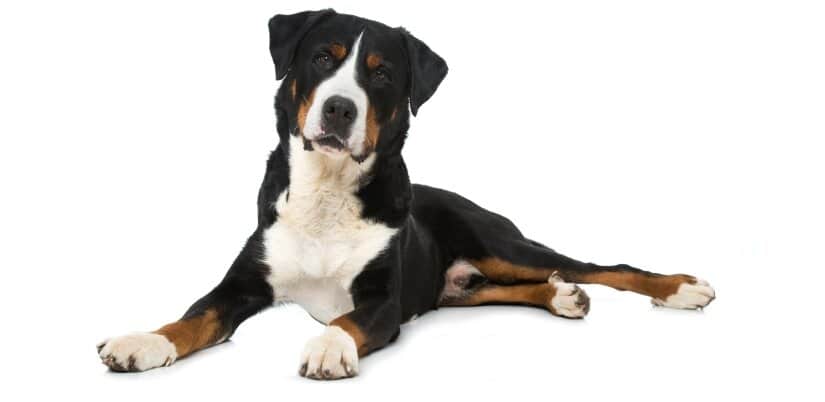



The Greater Swiss Mountain Dog, also known as the Grosser Schweizer Sennenhund, or Alpine Mountain Dog, originated from Switzerland. This dog breed is part of the UKC, Guardian Group, and the AKC, Working Group. It is believed to be one of the oldest of the Swiss dog breeds. This dog breed came about by breeding Roman Mastiffs and local Swiss dogs.
Brief History
This dog breed originated from war dogs that were brought over the Alps by Julius Caesar’s legions. The Greater Swiss Mountain Dog is thought to be related to the Saint Bernard dog breed. It was used as an all-purpose dog breed and draft dog breed by farmers in Switzerland. This breed worked hard pulling loads of meat and dairy to the market in dog carts. The Swissie breed is also related to the Bernese Mountain Dog. This dog breed was recognized in the AKC in 1995.
Physical Description
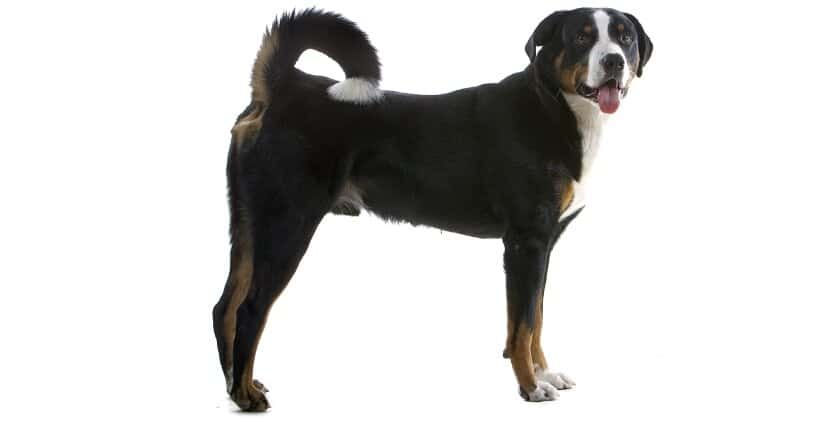
The Greater Swiss Mountain Dog is a large, tri-colored dog breed. This dog breed is muscular, and is slightly longer than it is tall. With a large head that has a flat, broad skull, and a broad, strong muzzle, this breed has medium-sized triangular drop ears. The almond-shaped eyes are brown or dark brown, and the nose is black. The neck is of medium length, with the chest deep and broad. The tail is long and tapered. This dog breed has a double coat that has a thick undercoat. The outercoat is dense. The undercoat color ranges from a preferred dark gray to light gray to tawny. The coat can have white and rust markings. The Greater Swiss Mountain Dog is bold, vigilant, and a hard working dog breed.
Temperament
The Greater Swiss Mountain Dog is a devoted and even tempered dog breed that is territorial and alert. This dog breed enjoys people, and is never aggressive. It is good with children. Swissies are extremely strong and agile. They are also majestic in presence. This breed loves food, and is best suited as a hiking companion. The Swissie is a confident dog breed that is powerful, yet gentle with everyone that he comes into contact with.
Special Needs
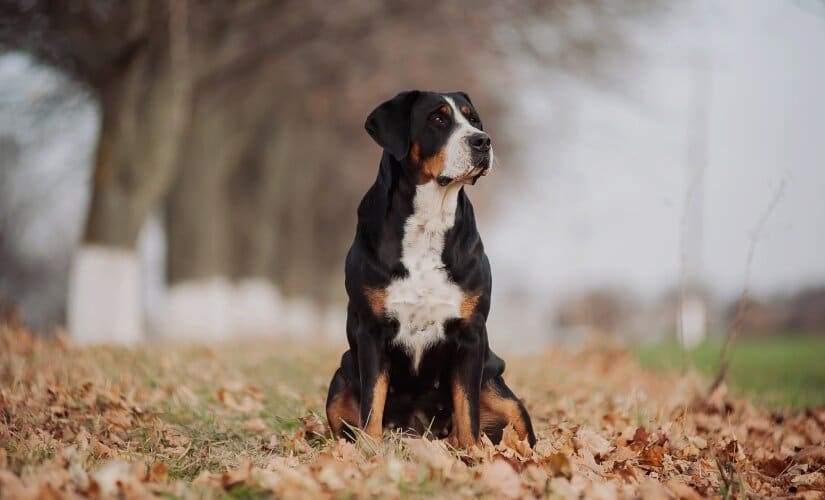
The Greater Swiss Mountain Dog is prone to weight problems, and should be kept at the correct weight. This avoids strain on the back, and also legs. It’s hard to resist the affectionate Swissie begging at the dinner table, but be sure to feed only healthy foods. Treats should also be healthy, and low calorie, so that the Swissie does not become obese. The Swissie does best with early socialization, and positive puppy training starting during puppyhood. Additionally, because the Swissie is such a large breed, dog parents need to make sure not to allow this large breed to jump up on children when playing.
Everyday recreational activities like running, biking, and boating with your Swissie allow for fun family days. The socialization process should begin during the first few weeks of puppyhood. Swissies need to be exposed earlier on in life to other people, small animals, and different noises. This breed needs to be handled, bathed and groomed from puppyhood, so that he learns how to relax and enjoy day-to-day life. Children need to be taught to have self-control when playing with this large breed, so that they treat puppies and adult dogs gently, and don’t encourage rough play.
Possible Health Concerns
The Swissie is a moderately active and healthy dog breed that may be susceptible to the following health problems:
- Bloat: This breed is deep-chested, and thus more prone to bloat. Bloat is a life threatening emergency. It is caused by the twisting of the stomach, together with the accumulation of gas, with or without fluid. It is best to never elevate your dog’s water and food bowls. Stress is also a major factor in causing bloat. Never feed your Swissie a large meal, followed by vigorous exercise. At the first signs of dry vomiting, restlessness and discomfort, contact your emergency veterinarian. Never wait for a few hours. This is a true emergency that is life-threatening!
- Epilepsy: is an inherited disease that causes seizures. Swissies will generally require treatment with anticonvulsants from their veterinarians.
- Hip Dysplasia: is an abnormal development of the hip joint in large dog breeds like the Swissie. It is generally characterized by a loose joint, and then degenerative joint disease. Dogs should be fed a high-quality diet that is geared towards their life stage. Puppies should only be fed high-quality puppy dog food. Excessive growth, types of exercise, nutritional factors, and hereditary factors all come in to play with hip dysplasia. Consult with your veterinarian for expert advice.
Exercise
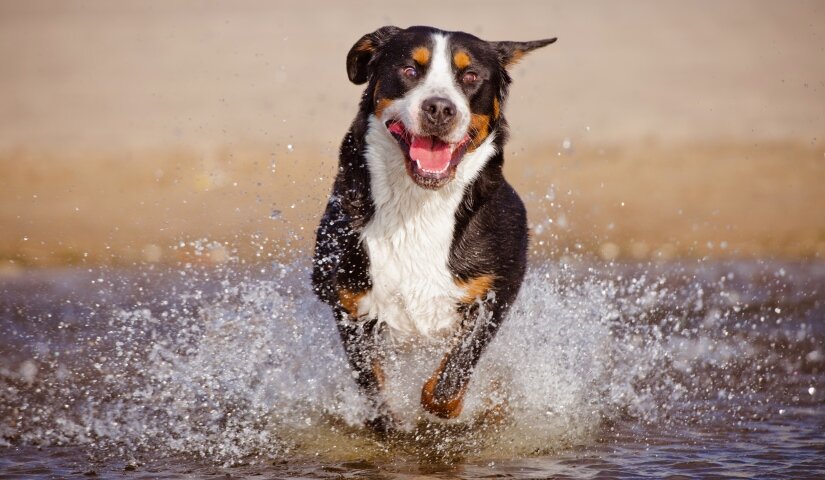
The Swissie is a moderately active dog breed that thrives on environmental stimuli, and exercise. This is a working dog breed that needs to have a job. This dog breed does well with a long walk, instead of long distance running. That said, they do enjoy the dog park and beach with plenty of off-leash runs.
Canine sports like agility, obedience, dock diving, Earthdog Trials, conformation shows, therapy work, Search and rescue work, canine freestyle, and even lure coursing will allow for your dog to expend his energy. Try out many different canine sports to see which sport your Swissie prefers the most. Herding and Frisbee are also stress-free ways that your dog can have fun. That said, some of the best activities you can have with your dog are unorganized like going out for a long hike. Plan hikes and all exercise schedules for cool mornings and late afternoons during the hot summer months. This dog breeds thrives in the snow, and cool temperatures.
Nutrition
Good nutrition is key to good health in dogs. Always opt for the very best high-quality dog food that you can afford. Feed the appropriate food for the life stage of your Swissie. During the hot summer months, a lower protein (20%), based dog food is recommended, whilst in the winter a higher protein (32%) is recommended. Every Swissie is different, and a diet that works for one may not work for another.
Consult with your veterinarian about the best dog food options for your pooch. Feeding the correct diet from puppyhood will save you a small fortune in veterinary bills later on.
Grooming
The Swissie is super easy to groom. This breed has an undercoat, and they do shed twice a year. It is necessary to take out the “old coat’ using a soft brush and metal comb.
That said, daily grooming is always recommended along with regular bathing, brushing teeth, ear cleaning, and nail trimming. Visits to the veterinarian are recommended for teeth cleaning twice yearly.
Adopting a Swissie
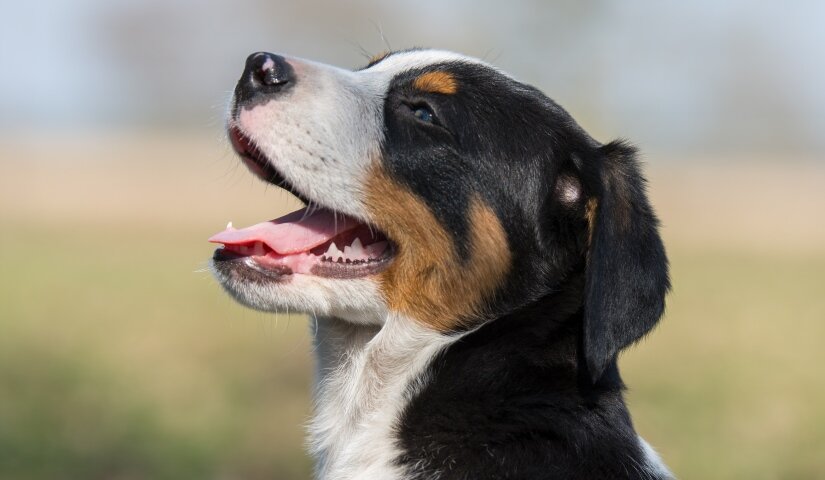
Breeds like the Swissie are terrific additions to any home, especially those with children and other animals. This very sweet and social dog breed needs to be loved and treated with affection. In fact, they just love being everywhere with you. Swissies do not do well being left alone all day. They form a very strong bond with their dog parents and family, and tend to enjoy it most when everyone is at home together. This dog breed is a family dog.
Some normal behaviors may occur after adoption which may include digging holes, barking or perhaps being slightly depressed. Before adopting a Swissie, find out about his past. Take your dog’s past history into account when figuring out quirky behavioral issues. If any behavior becomes excessive, consult your veterinarian.
Give your Swissie time to adjust to his new surroundings, and entertain him with non-toxic, safe dog toys, soft blankies, tennis balls and healthy dog treats. This dog breed enjoys the comforting scent of people, most especially family, including children. As with any dog adoption, make sure that you have the time and resources to take good care of your Swissie!
